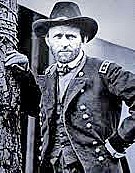
As the city’s Parks Naming Committee gets ready to resume its deliberations (next Monday, April 22), its members could do worse than consider for honors a onetime resident of some distinction. I mean, as long as generals on horseback are in fashion….
Here was the man, a modest, regular-fellow sort with a bit of blues in his soul, in 1861: “I’ve tried to reenter service in vain. I must live, and my family must live. Perhaps I could serve the army by providing good bread for them. You remember my success at baking bread in Mexico.”
These words were from a desperate U.S. Grant, in a letter to childhood friend Chilton White mid-way of that first year of conflict, as war was beginning and the former captain, who had served in the Mexican War and at various peacetime posts, tried to find a role for himself. The future four-star General and two-term President had been forced to resign his commission in 1854 after being caught drunk on post and had endured seven lean years of unbroken ill luck at a variety of makeshift civilian jobs.
At the time he wrote this letter, he had already made three abortive efforts to reenter the military and most recently, had been forced to cool his heels as a supplicant in the outer office of the Army’s then rising star, the somewhat self-enamored General George B. McClellan, who had made a point, as several other potential saviors had, of ducking this apparently used-up hard-luck case. As Grant described the last of his several attempts to see McClellan, “Next day I came in. The same story. The General had just gone out, might be in at any moment.”
Baking bread! This last-straw reference was to a skill Grant, a West Point graduate, had developed while serving as a unit quartermaster in Mexico along with the aforesaid White during a war of conquest — one which, as he clearly recognized at the time, was both unjust and ominously created an opportunity for the wholesale expansion of slavery. In his Memoirs, Grant would pinpoint the Mexican War as the event which made later civil war inevitable.
“For myself, I was bitterly opposed to the measure [the precipitating annexation of Texas], and to this day regard the war as one of the most unjust ever waged by a stronger against a weaker nation.” The American government was “following the bad example of European monarchies in not considering justice in their desire to acquire additional territory.”
Quite obviously, the down-and-out Grant of 1861 would get lucky, not long after writing the above-mentioned letter, fluking into a modest regimental command of a volunteer unit in Illinois when the previously appointed commander proved unable to maintain discipline. There happened to be a surfeit of such commands in Illinois because the then President of the United States, one Abraham Lincoln, had made sure that his native state had more than its share.
History has amply recorded that Grant was able to properly avail himself of his unexpected good fortune.
Later, after a celebrated run of victories in the Western theater, from Fort Donelson to Shiloh to Vicksburg, and with command in the decisive eastern theater still in his future,the serially promoted Grant made Memphis his interim headquarters for extended periods of time and conducted himself with studious benevolence toward the inhabitants.
Of this period, historian Jean Edward Smith (whose biographies of Grant and FDR are both must-reads) records: “Grant’s sympathetic approach helped to turn the tide of public opinion in Memphis, a city that had been among the most devoted to the Confederacy. On August 25 [1863] the board of trade hosted a dinner in his honor, and on the next night the mayor and city council followed suit. Grant was presented to the 200 guests with the toast, ‘Your Grant and my Grant,’ in which his reopening of the Mississippi to commerce was compared to the exploits of two other local heroes, Hernando deSoto and Robert Fulton.
“…At the second banquet, General Stephen Hurlburt, the Memphis commander, read a brief statement Grant had written thanking the citizens for their kindness and expressing his pleasure at the public exhibition of loyalty to the United States. “The stability of the Government and the unity of this nation depend solely on the cordial support and the earnest loyalty of the people…I am profoundly gratified at this public recognition, in the city of Memphis, of the power and authority of the Government of the United States.” When Hurlburt concluded, the audience gave Grant a prolonged standing ovation.”
Grant was a tiger at warfare. As we might say, apropos a certain basketball team we admire, he was all grit and grind. But, as we know from the way he treated Lee at Appomattox, he was possessed of a certain grace and generosity as well and was a man worth commemorating as a part of Memphis history.